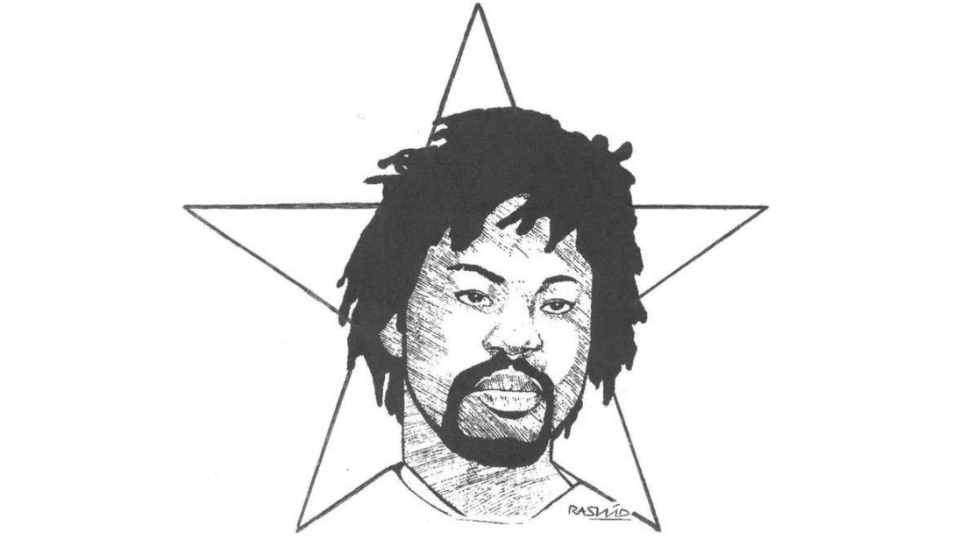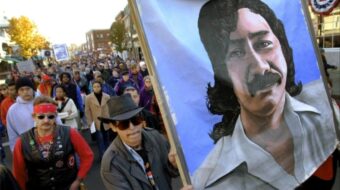
Kevin “Rashid” Johnson has been held prisoner for over 30 years and still maintains his innocence. He was convicted in 1990 for a murder charge when he was just 18 years old. Since that time, he has become a prominent figure within the Black liberation movement and a fighter for the rights of incarcerated people.
Johnson has been outspoken about his first-hand experience as a victim of the prison-industrial complex within the United States. Now, he’s fighting for his life against prostate cancer due to the negligence of the prison system to appropriately care for his health.
In 2018, Johnson was part of an organizing effort to conduct a strike by inmates in multiple facilities across the country to bring attention to the harsh conditions inside the prisons. The strike put forward several demands, including immediate improvement of conditions and prison policies, along with more rehabilitation services for the incarcerated.
Johnson’s lawyers later alleged that their client was punished for his involvement in the strike by being placed in solitary confinement in an unheated cell in freezing temperatures.
In a 2018 article in The Guardian, Johnson explained that “prison labor as slave labor” still exists in the United States. He asserted, “In fact, slavery never ended in this country. At the end of the Civil War in 1865, the 13th Amendment of the U.S. Constitution was introduced…. [but] under its terms, slavery was not abolished, it was merely reformed.”
Critics of the mass incarceration system believe Johnson’s outspoken political stances have contributed to his repression over the years.
He has been subject to a plethora of abuses while incarcerated, including over 18 years in torturous solitary confinement. He has developed several health problems while incarcerated, including a recent cancer diagnosis.
During a biannual routine examination, Johnson was shown to have excessively high PSA (prostate-specific analysis) levels in his blood, indicating potentially serious issues. On Oct. 8, 2021, he tested at a 14.3 PSA level, impossible to mistake for the healthy measure of approximately 4 PSA. Recognizing the test results as abnormal, the prison doctor told Johnson to re-test in a month to make sure the results weren’t an outlier.
He subsequently tested at a 14.6 PSA. Despite these alarming test results, the medical staff at Nottoway Correctional failed to take appropriate action, as they chose not to schedule a follow-up appointment after the second result.
During his next biannual appointment—six months later— Johnson had been seen by a different doctor, with the same result of 14.6 PSA in his blood. This time, the doctor sent him to a urologist for further investigation. The consultation occurred in March 2022, with an MRI not taking place until late May. Johnson was not given these results but was instead scheduled for a biopsy in late June without explanation, being left completely in the dark about the state of his own health by the prison.
On July 1, 2022, Johnson was diagnosed with prostate cancer, almost nine months after his dangerously high PSA result. This catastrophic series of events has caused Johnson to barely be able to walk, with extreme swelling in both of his legs. This was an entirely preventable outcome if action had been taken earlier to remedy his glaring health issue.
This gross negligence and abuse is not the exclusive experience of Johnson. It is indicative of a broader issue plaguing the system of mass incarceration in the United States. People in prisons are treated as subhuman, not worthy of the same level of care or attention as someone on the outside.
With such a disproportionate number of the incarcerated population being African-Americans, including Johnson, this equates to nothing less than a race-based system of oppression and neglect. It is worth noting that there is a history of abuse and maltreatment of those incarcerated figures who speak out against the repressive U.S. police state and its accompanying prison-industrial complex.
At this stage, even with his dire situation, the prison has not accelerated the process for proper care. Johnson has yet to see a radiologist, which will then have to refer him to an oncologist to finally decide on a plan of action. As of today, it will take approximately six months longer for Johnson to be treated for his cancer if supporters don’t demand change.
There must be justice for Johnson, and other incarcerated persons dealing with oppressive and subhuman treatment. If you wish to fight against the abuse, you can call or send a message to the prison using the contact info below to demand immediate medical attention.
Make sure to mention Johnson’s prison ID number, 1007485, when calling or emailing. Defend the life of Kevin “Rashid” Johnson. As he often signs off on his blog posts and articles, “Dare to struggle, dare to win!”
DIRECTOR OF HEALTH SERVICES, VDOC:
STEVE.HERRICK@VADOC.VIRGINIA.GOV
and
804-887-8178
WARDEN CLINT DAVIS:
CLINT.DAVIS@VADOC.VIRGINIA.GOV
434-767-5543
JOSEPH WALTERS, VADOC DEPUTY
DIRECTOR OF CORRECTIONS:
JOSEPH.WALTERS@VADOC.VIRGINIA.GOV
804-887-7982
KYLE ROSCH, VIRGINIA INTERSTATE
COMPACT ADMINISTRATOR:
804-887-8404












Comments